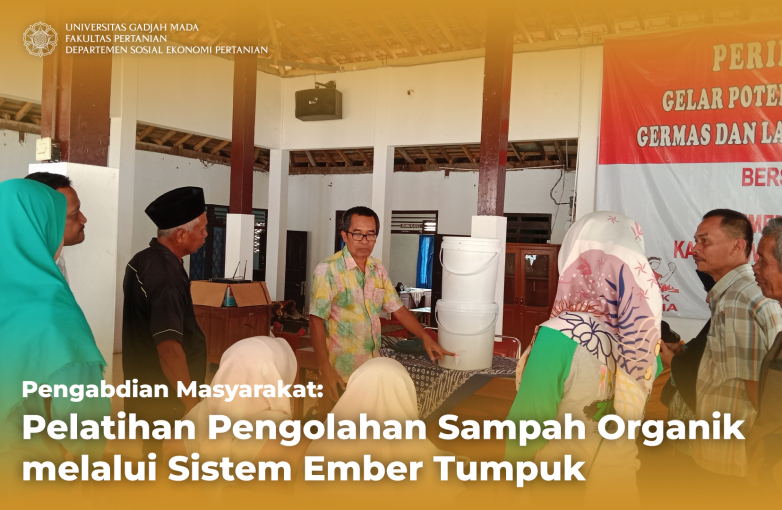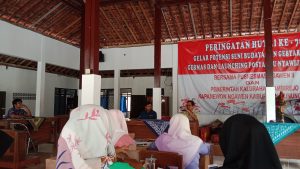
On October 25, 2023, one of the study programs from the Department of Agricultural Socioeconomics, namely the Agricultural Extension and Communication Study Program, Gadjah Mada University (UGM), held a community service activity aimed at providing practical knowledge about processing organic waste using a stacked bucket system. This activity took place at the Sambirejo Village Hall, Ngawen, Gunungkidul, and was attended by representatives from Gapoktan Sambirejo, Prima Melati Sambirejo Village, and KWT Ngudi Lestari Ngrombo Karangmojo.
One of the lecturers at the Soil Department, Faculty of Agriculture, UGM, Mr. Nasih Widya Yuwono, S.P., M.P., was the speaker at this activity. He shared knowledge about making stacked buckets and explained the benefits of using a stacked bucket system in producing affordable liquid organic fertilizer for farmers. The stacked bucket is a simple but very effective organic waste composting system. In the training session, Mr Nasih provided practical guidance on making stacked buckets using simple materials that can be found around the environment. Apart from that, he also explained how this stacked bucket system can produce liquid organic fertilizer that is rich in nutrients, which in turn can improve soil quality and agricultural yields.

The training participants, consisting of farmer representatives from various farmer groups, were enthusiastic about participating in this activity. They had the opportunity to be directly involved in making stacked buckets, understand the process of composting organic waste, and learn about the benefits of using liquid organic fertilizer in their farming. The activity took place smoothly and full of enthusiasm. The participants not only listened to explanations from the presenters but also actively asked questions and discussed, creating an interactive and fun learning atmosphere. After this activity is carried out, the participants are expected to be able to implement the knowledge they have gained in their daily lives.
The UGM Agricultural Extension and Communication Study Program, as the organizer of this activity, hopes that farmers can apply the knowledge conveyed to them to use it well in their daily practice. By adopting the stacked bucket system and utilizing the liquid organic fertilizer it produces, the growth and development of farmers’ plants can increase significantly. Using environmentally friendly liquid organic fertilizer will also help maintain the balance of the agricultural ecosystem, create a healthy environment, and increase agricultural land productivity.
With community service activities like this, the UGM Agricultural Extension and Communication Study Program contributes to advancing the agricultural sector in Indonesia by increasing farmers’ knowledge and skills, as well as implementing sustainable and environmentally friendly agricultural practices. Through collaboration between universities, experts, and farming communities, Indonesia can continue to develop the agricultural sector towards sustainability and prosperity for all farming communities in this country.
